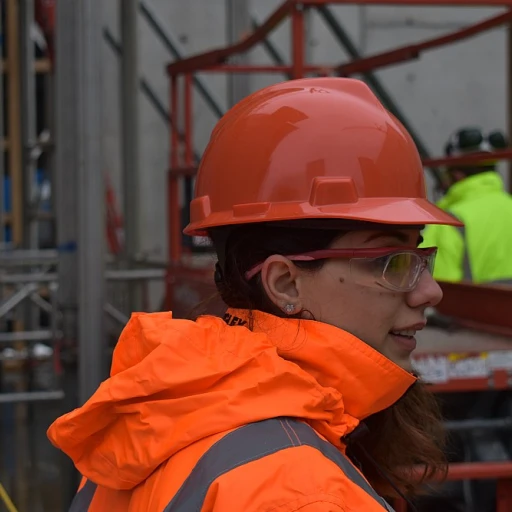
Understanding the evolving responsibilities of the hiring manager
How the Hiring Manager’s Role is Changing in Modern Recruitment
The responsibilities of a hiring manager in today’s human resources landscape are evolving rapidly. No longer limited to reviewing resumes and conducting interviews, managers now play a central role in shaping the entire recruitment process. As companies compete for top talent, the hiring manager is expected to collaborate closely with recruiters, the hiring team, and other stakeholders to define job descriptions, set expectations, and ensure a positive candidate experience throughout the hiring process.
Modern hiring managers are also responsible for:
- Partnering with talent acquisition teams to identify the skills and experience needed for each open position
- Ensuring the recruitment process aligns with company culture and values
- Participating in training development to stay updated on best practices in recruitment and interviewing
- Making the final decision on candidate selection, balancing input from the hiring team and recruiter
- Championing fairness and consistency in the interview process
With the integration of artificial intelligence, the manager’s role is shifting from administrative tasks to more strategic involvement. AI-powered tools are helping managers streamline the hiring process, freeing up time to focus on evaluating candidates’ fit for the company and team. This shift is also pushing managers to develop new skills, such as interpreting AI-driven insights and ensuring ethical use of technology in recruitment.
For a deeper look at how AI is transforming talent acquisition and the responsibilities of hiring managers, explore this resource on AI in talent acquisition solutions.
As the recruitment process becomes more complex, the hiring manager will continue to serve as a key human resources partner, ensuring that both the company and candidates benefit from a fair, efficient, and engaging experience.
AI-powered tools that support hiring managers
AI Tools Transforming the Recruitment Workflow
Artificial intelligence is reshaping the way hiring managers and recruiters approach the recruitment process. From sourcing candidates to scheduling interviews, AI-powered tools are streamlining tasks that once consumed significant time and resources. These solutions are not just about automation—they are about enhancing the human resources department’s ability to identify top talent and improve the overall candidate experience.- Automated Resume Screening: AI can quickly scan and evaluate hundreds of resumes, identifying candidates whose skills and experience best match the job description. This allows hiring teams to focus on the most promising applicants, reducing time-to-hire and minimizing manual errors.
- Intelligent Candidate Matching: Advanced algorithms analyze job requirements and candidate profiles, suggesting the best fit for an open position. This supports hiring managers in making data-driven decisions and ensures a more objective recruitment process.
- Interview Scheduling Assistants: AI-powered scheduling tools coordinate calendars between candidates, hiring managers, and recruiters, eliminating back-and-forth emails and speeding up the interview process.
- Chatbots for Candidate Engagement: AI chatbots answer candidate questions, provide updates, and guide applicants through the recruitment process, improving communication and candidate experience.
- Predictive Analytics: These tools forecast candidate success and retention, helping the hiring team make informed decisions that align with company culture and long-term goals.
Balancing automation and human judgment in recruitment
Finding the Right Balance Between Automation and Human Insight
As artificial intelligence becomes more integrated into the recruitment process, hiring managers and recruiters face a new challenge: balancing the efficiency of automation with the irreplaceable value of human judgment. While AI-powered tools can quickly screen resumes, analyze candidate data, and even schedule interviews, the human element remains essential for making the final decision and ensuring a strong fit with company culture.
- Efficiency vs. Empathy: AI can handle repetitive tasks in the hiring process, such as parsing job descriptions or matching candidate skills to open positions. However, understanding a candidate’s motivation, communication style, and alignment with the team still requires a manager’s personal touch.
- Supporting, Not Replacing: The role of AI is to support hiring managers and talent acquisition partners, not to replace them. For example, AI can suggest which candidates to prioritize, but the manager will ultimately decide who advances in the interview process based on a holistic view of the candidate’s experience and potential.
- Collaboration Across the Hiring Team: AI-driven insights can help the hiring team identify patterns in the recruitment process, such as which interview questions yield the best results or which sources attract the most qualified candidates. Still, the hiring manager and recruiter must collaborate to interpret these insights in the context of the company’s unique needs.
It’s also important to remember that while automation can streamline the recruitment process, over-reliance on AI risks overlooking qualities that are difficult to quantify, such as adaptability or cultural fit. Human resources departments should ensure that AI is used as a tool to enhance, not diminish, the candidate experience and the quality of hires.
For organizations looking to optimize their recruitment process with AI, it’s crucial to invest in training and development for hiring managers. This helps them understand both the capabilities and limitations of AI, so they can use these resources effectively and maintain a human-centric approach to talent acquisition. For more on how AI can improve your recruitment website and candidate experience, check out this guide on enhancing recruitment website design with AI.
Addressing bias and fairness in AI-driven hiring
Mitigating Bias in AI-Driven Recruitment
As artificial intelligence becomes more embedded in the recruitment process, concerns about fairness and bias have taken center stage. While AI can help hiring managers and recruiter teams process large volumes of candidate data efficiently, it is not immune to the biases present in historical data or job descriptions. This means that the hiring manager and the broader human resources department must remain vigilant to ensure that the technology supports, rather than undermines, fair hiring practices.
- Understanding Bias Sources: AI systems learn from existing company data, which may reflect past biases in the hiring process. For example, if a company’s previous recruitment favored certain backgrounds, the AI may inadvertently replicate those patterns in candidate selection.
- Human Oversight Remains Essential: The final decision in the interview process should not rest solely on AI recommendations. Managers, recruiters, and the hiring team must review AI-generated shortlists and interview outcomes to ensure alignment with company culture and diversity goals.
- Transparent Algorithms: It’s important for the talent acquisition partner and manager recruiter to understand how AI tools make decisions. Transparency in the recruitment process helps build trust among candidates and within the hiring team.
- Continuous Training and Development: Regular training development for hiring managers and human resources professionals is key. This helps them recognize potential biases in AI outputs and adjust the process accordingly.
Promoting Fairness in Candidate Evaluation
AI can help standardize how candidates are evaluated, reducing the impact of unconscious bias during the interview process. However, fairness is only achieved when the hiring manager and recruitment team actively monitor and audit AI-driven decisions. This includes reviewing how job descriptions are written, ensuring the language is inclusive, and making sure the recruitment process is accessible to all candidates.
By combining the efficiency of AI with the judgment and experience of human resources professionals, companies can create a more equitable hiring process. The manager hiring for an open position should always balance data-driven insights with an understanding of the unique skills and experiences each candidate brings to the team.
Improving candidate experience with AI
Personalizing Communication and Engagement
AI is making a real difference in how candidates experience the hiring process. Automated tools can now send personalized updates to candidates, keeping them informed about their application status and next steps. This reduces the uncertainty many job seekers feel and helps the hiring team maintain a positive image for the company. For example, chatbots can answer questions about the job description or interview process, making information accessible at any time.Reducing Delays and Improving Transparency
One of the main frustrations for candidates is waiting for feedback. AI-powered scheduling tools help managers and recruiters coordinate interviews more efficiently, minimizing delays. Automated reminders and real-time updates mean candidates are less likely to feel lost in the recruitment process. This also frees up human resources professionals to focus on more complex tasks, such as evaluating skills and cultural fit.Supporting Fair and Consistent Interactions
AI can help ensure that every candidate receives a consistent experience. Automated assessments and structured interview guides support hiring managers in asking the same questions and evaluating responses fairly. This consistency is important for both fairness and compliance, and it helps the company build trust with candidates. However, it's still essential for the hiring manager or recruiter to provide a human touch, especially when delivering feedback or making the final decision.Enabling Better Feedback and Learning
With AI, it's easier for the hiring team to collect feedback from candidates about their experience. This data can highlight areas where the recruitment process could be improved, such as communication, interview scheduling, or clarity of the job description. Continuous improvement in these areas helps the company attract top talent and strengthens the employer brand.- AI-driven communication tools keep candidates informed and engaged
- Automated scheduling reduces waiting times and confusion
- Structured assessments support fairness and transparency
- Feedback collection enables ongoing improvement in the hiring process
Preparing hiring managers for the future of AI in HR
Building AI Literacy Across the Hiring Team
As artificial intelligence becomes more integrated into the recruitment process, hiring managers and their teams need to develop new skills. Understanding how AI tools function, what data they use, and how they impact candidate selection is now essential. Training and development programs focused on AI literacy can help managers and recruiters make informed decisions, ensuring that technology supports rather than replaces human judgment.
Adapting to New Collaboration Models
The role of the hiring manager is evolving. Collaboration between the hiring manager, recruiter, and talent acquisition partner is more dynamic, with AI-driven insights shaping every stage of the hiring process. Managers will need to work closely with human resources and recruitment teams to interpret AI-generated recommendations and align them with the company culture and job requirements. This partnership ensures that the final decision reflects both data-driven insights and the human perspective.
Continuous Learning and Change Management
AI in human resources is not static. As new tools and platforms emerge, the hiring team must stay updated on best practices and regulatory changes. Ongoing training, open communication, and feedback loops help managers adapt to these changes. Encouraging a culture of continuous learning within the department prepares everyone for future shifts in the recruitment process, from job description creation to the interview process.
Championing Ethical Use of AI
Hiring managers play a key role in ensuring that AI is used ethically and fairly. They must be vigilant about potential biases in AI-driven hiring and advocate for transparent processes. By working with human resources to audit AI tools and monitor outcomes, managers help create a fair experience for all candidates. This commitment strengthens trust in the company’s hiring process and supports a positive employer brand.
- Invest in training development focused on AI and data literacy for the hiring team
- Foster collaboration between manager, recruiter, and human resources to interpret AI insights
- Encourage ongoing learning to keep up with evolving AI technologies in talent acquisition
- Promote transparency and fairness in every step of the recruitment process













